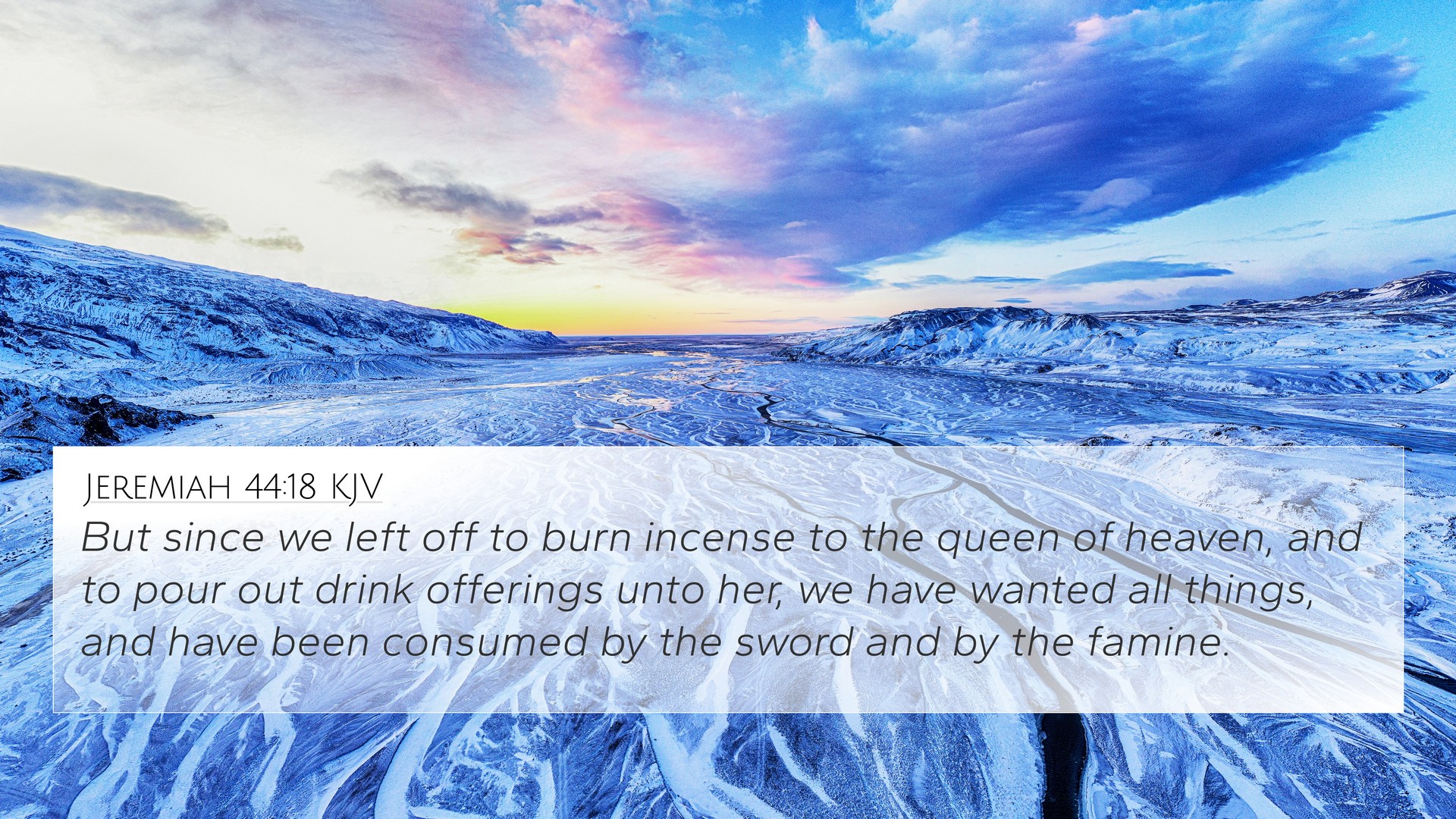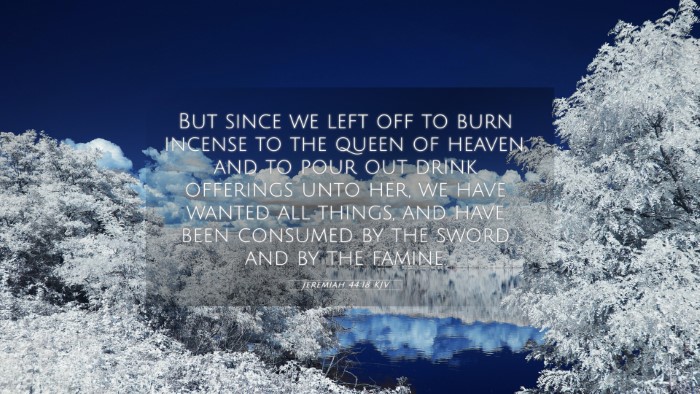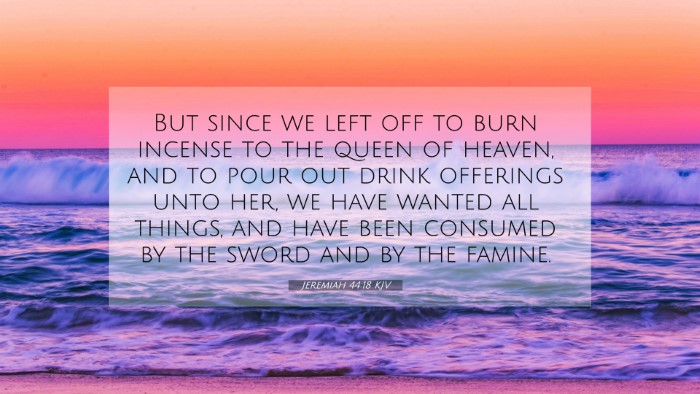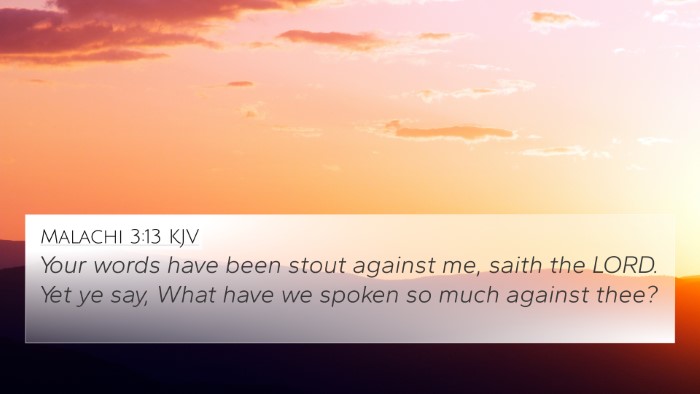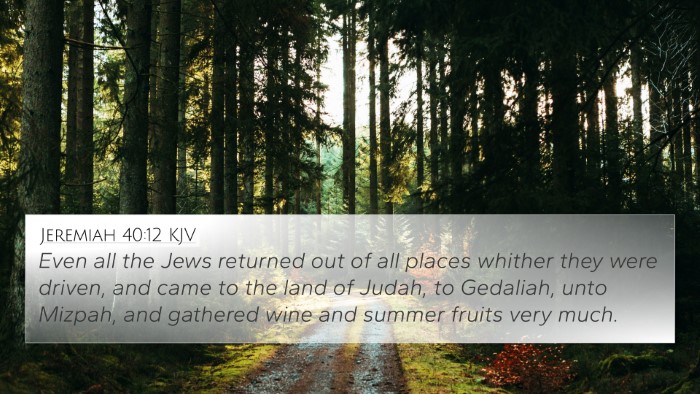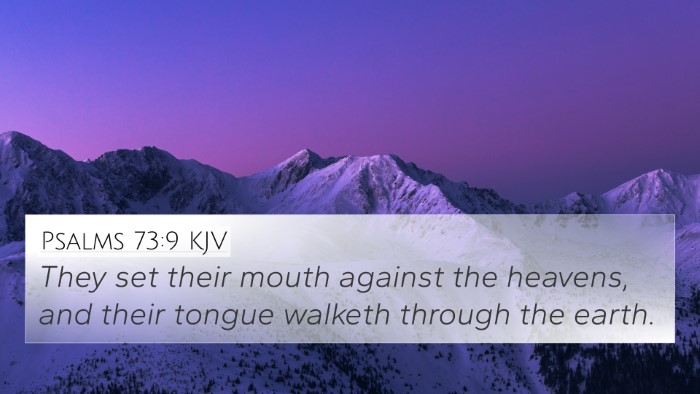Understanding Jeremiah 44:18
Jeremiah 44:18 reveals the responses of the people of Judah who were living in Egypt regarding their worship practices. The verse states:
"But since we stopped burning incense to the queen of heaven and pouring out drink offerings to her, we have lacked everything and have been destroyed by sword and famine."
Meaning and Context
In this verse, the people express their belief that abandoning the worship of the queen of heaven, a representation of idolatry, has led to their misfortunes. This reflects the common theme in the Bible where idolatry leads to negative consequences.
Commentary Insights
This analysis draws from public domain commentaries by Matthew Henry, Albert Barnes, and Adam Clarke.
-
Matthew Henry:
Henry explains that the queen of heaven symbolizes the persistent idolatry of the people. He notes that their current suffering serves as a punishment for turning from God to false deities.
-
Albert Barnes:
Barnes emphasizes the folly of the people in attributing their woes to a slight in worship practices rather than to their abandonment of the true God. He argues that God's judgment is the root cause of their despair.
-
Adam Clarke:
Clarke focuses on the cultural context of the queen of heaven, likely referring to the Babylonian goddess Ishtar. He discusses how this worship was integral to the people’s identity while pointing out the dangers of syncretism.
Key Themes and Biblical Connections
Jeremiah 44:18 is heavily laden with themes of idolatry, punishment for disobedience, and the struggles of returning to true worship. The verse serves as a cautionary tale about the dangers of abandoning faithfulness to God.
Bible Verse Cross-References
This verse can be connected to several other scriptures which also deal with themes of idolatry and divine judgment:
- Exodus 20:3-5 - God commands not to have other gods before Him.
- Isaiah 30:1-2 - A warning against seeking help from Egypt rather than trusting in the Lord.
- Hosea 4:6-7 - The rejection of knowledge leads to destruction, illustrating the consequences of covenant unfaithfulness.
- Ezekiel 14:6 - Calls for repentance from idols and turning back to God is emphasized.
- Romans 1:25 - Paul discusses how people exchanged the truth of God for a lie, showcasing the consequences of idolatry.
- Revelation 21:8 - Addresses the fate of idolaters in contrast to those who are faithful to God.
- Jeremiah 2:13 - God expresses the issue of His people seeking broken cisterns instead of the living water.
Comparative Bible Verse Analysis
Through linking Bible scriptures, we observe a consistent motif of choosing between the worship of the true God or returning to idolatry. The emotional and spiritual consequences of such choices are explored through their narratives across both testaments.
Thematic Bible Verse Connections
This verse highlights the theme of divine retribution associated with idolatry which can be further explored through:
- Idolatry as a central sin in both the Old and New Testaments.
- The call to true repentance as seen throughout the prophetic books.
- The recurring judgment against nations for their failures to acknowledge God.
Tools for Bible Cross-Referencing
Using a Bible concordance or a Bible cross-reference guide can greatly help in finding connections between similar verses and themes. Learning how to use Bible cross-references effectively unlocks deeper scriptural understanding.
Cross-Referencing Bible Study Methods
Engaging in cross-referencing Bible study methods encourages personal reflection on the scripture. It provides an avenue to explore:
- Identifying connections between Old and New Testament teachings.
- Understanding the detailed cross-reference between Gospels.
- Exploring links between the Prophets and Apostolic teachings.
- Finding Bible verses related to specific themes, like idolatry or faithfulness.
User Intent Keywords
As we explore this verse, one may seek to understand specifically:
- What verses are related to Jeremiah 44:18?
- How do Jeremiah 44:18 and Ezekiel 14:6 connect?
- What similarities exist between this verse and Exodus 20:3-5?
- What Bible verses support the call to return from idol worship?
Conclusion
In conclusion, Jeremiah 44:18 serves as a stark reminder of the consequences of forsaking God for idols. By utilizing the tools for Bible cross-referencing, one can uncover the rich inter-Biblical dialogue that extends beyond this single verse to reveal a comprehensive biblical narrative on faithfulness, the dangers of idolatry, and the implications of human choices in the sight of the Almighty.
